人教新课标选修六Unit5ThepowerofNature同步学案
人教版高二英语选修6_Unit_5_The_power_of_nature_全单元教案新部编本

教师学科教案[ 20 – 20 学年度第__学期]任教学科:_____________任教年级:_____________任教老师:_____________xx市实验学校Unit 5 The power of nature1.教材分析本单元以The power of nature 为话题,旨在通过单元教学使学生了解火山爆发、地震、台风、洪水等自然现象,认识到自然的伟大力量,并会用所学词汇描述在经历自然灾害时的感受,思考人类应对自然灾害的态度和方法,提高自我保护意识。
1.1 Warming Up通过对火山爆发示意图的讨论激活学生了解与本单元话题相关的背景知识,而后通过讨论人类应对自然灾害的措施引发学生对本单元话题的思考,激发学生的求知欲,为随后进行的听、说、读、写打下基础。
1.2 Pre-reading通过回答问题测试自己是否适合作火山学家,让学生了解这一陌生职业,为阅读做好准备。
1.3 Reading部分一位火山学家以第一人称的形式讲述了自己的工作及第一次目睹火山爆发时的情景和心情,描写了人与自然的斗争与和谐相处的乐趣,使学生认识到火山是美丽的,但同时极具破坏力,而火山学家的工作可以减少由火山引发的损失。
1.4 Comprehending设计了两种题型:第一题要求学生在阅读后回答相关问题;第二题检测学生对文章细节的理解。
1.5 Learning about Language 分为词汇和语法两部分。
词汇部分着重从词的意义用法和表达方面对学生学习词汇给予指导;语法部分学习ing 形式在句子中作状语表示时间、原因及结果。
1.6 Using Language以语言实践为目的,包括四个部分的内容。
Listening and speaking 三位火山学家讲述了他们各自最惊险的一次经历。
学生在练习听力的同时学会描述害怕和紧张的词汇。
Speaking 是Listening的延续。
要求学生讲述自己类似的经历,同时在运用中巩固单词。
【原创】选修六Unit5 The power of nature学案

高中英语选修六Unit5The power of nature导学案课题:Unit5 Reading学习目标:略一、复习指导:复习本单元单词及自然灾害的表达二、课中探究单:完成以下阅读任务Task1: Read para1-2 carefully and answer the fowling questions1. Why does the writer say that he has the greatest job in the world?2. Why is a volcanologist’s job important?3. Where is Mount Kilauea?Task2: Read para3-4 carefully and answer the fowling questions4. Why is the lava that flows on Mount Kilauea more dangerous than theactual eruption?5. What caused the writer’s bedroom to become as bright as day eventhough it was night?6. Why did the scientists have to get close to the volcano after it beganerupting?7. Why was it difficult for the writer to walk towards the edge of the crater?Task3: Read para5 carefully and answer the questionWhat does the writer find impressive about volcanoes even after studyingthem for many years?Task4: Skim the text and get the main idea of the text.The writer expressed his _____ for his job as a ____________ and told us one of his unusual ___________in Mount Kilauea, Hawaii.Task5(summary): I have the ________ job in the world. I am never _____ with it. Although it is occasionally dangerous, I don’t mind because danger ______ me and makes me feel ____. I think my job is the most __________ because I can help _______ people from danger of volcanoes.I am a ___________ working for HVO. Our work has ______ many lives but unfortunately we can not save their _______. I have ___________ a volcano eruption in Hawaii. I was ____ asleep when my bed began _______ and I heard a _______ sound, like a _____ passing nearby. Then I found my bedroom was as ______ as day, and red lava was ___________ hundreds of meters into the air. The next day, three of us wanted to get close to the ______. We put on _________ suits, ________, big _______ and special ______, which made us look like __________. We slowly _____________ to the edge of the crater to collect some _____ for __________. After studying volcanoes for many years, I am just as ___________ about my job as before. Why? Because of their ________ and their _________ to cause great damage.。
新课标人教版选修六教案Unit 5 The power of nature
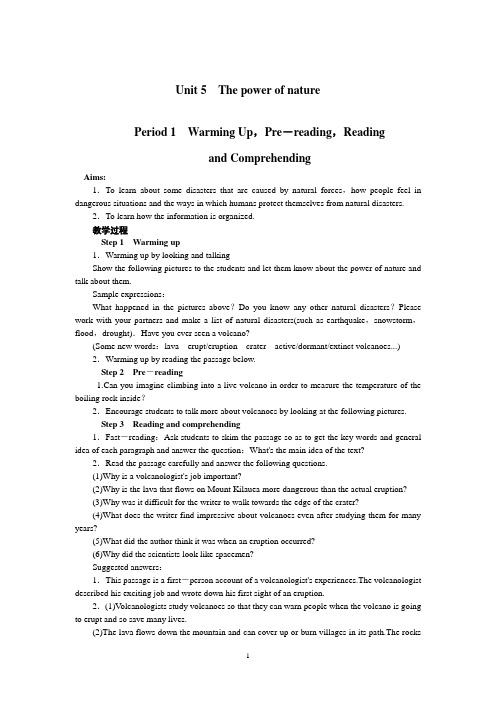
Unit 5The power of naturePeriod 1Warming Up,Pre-reading,Readingand ComprehendingAims:1.To learn about some disasters that are caused by natural forces,how people feel in dangerous situations and the ways in which humans protect themselves from natural disasters.2.To learn how the information is organized.教学过程Step 1Warming up1.Warming up by looking and talkingShow the following pictures to the students and let them know about the power of nature and talk about them.Sample expressions:What happened in the pictures above?Do you know any other natural disasters?Please work with your partners and make a list of natural disasters(such as earthquake,snowstorm,flood,drought).Have you ever seen a volcano?(Some new words:lava erupt/eruption crater active/dormant/extinct volcanoes...)2.Warming up by reading the passage below.Step 2Pre-reading1.Can you imagine climbing into a live volcano in order to measure the temperature of the boiling rock inside?2.Encourage students to talk more about volcanoes by looking at the following pictures.Step 3Reading and comprehending1.Fast-reading:Ask students to skim the passage so as to get the key words and general idea of each paragraph and answer the question:What's the main idea of the text?2.Read the passage carefully and answer the following questions.(1)Why is a volcanologist's job important?(2)Why is the lava that flows on Mount Kilauea more dangerous than the actual eruption?(3)Why was it difficult for the writer to walk towards the edge of the crater?(4)What does the writer find impressive about volcanoes even after studying them for many years?(5)What did the author think it was when an eruption occurred?(6)Why did the scientists look like spacemen?Suggested answers:1.This passage is a first-person account of a volcanologist's experiences.The volcanologist described his exciting job and wrote down his first sight of an eruption.2.(1)V olcanologists study volcanoes so that they can warn people when the volcano is going to erupt and so save many lives.(2)The lava flows down the mountain and can cover up or burn villages in its path.The rocksthat erupt from the volcano usually don't damage anything because no one lives near the crater.(3)The author was wearing special protective clothing that made it difficult to walk.(4)The author finds their beauty and their potential to cause great damage very impressive.(5)He thought it was an earthquake.(6)Because they wore white protective suits that covered their whole body.3.Ask students to scan for detailed information and discuss the following question with their partners and be prepared to report to the class.Question:Having learned a little more about the work of a volcanologist,do you think it is an occupation you would enjoy?Give you reasons.Suggested answers:No,I probably wouldn't enjoy this job because I wouldn't have to live in other countries and I don't like being in dangerous situations,either.Above all,I'm not very good at science.ORY es,I'd love to do a job like this because I would enjoy working outside and I think I would enjoy the adventure.It would be exciting to meet people from different countries and I would feel good about helping people avoid danger.Step 4Language studyDealing with any language problem if any(words or sentences students might not understand)to help the students to have a better understanding of the text.Step 5Listening,reading aloud and underliningAsk students to read the passage aloud to the tape and let them pay attention to the pronunciation of each word and the pauses within each sentence.Tell them to pick out all the useful expressions or collocations from the passage while reading and copy them to the notebook after class as homework.Collocations:make one's way,a live volcano,be about to do,look down into,out of the way,be covered with,burn to the ground,attach...to...,compare...with...,run out of Step 6Structure analyzingAfter reading,ask students to discuss the text structure.Keys for reference:This passage is a first-person account of a volcanologist's experiences.The volcanologist described his exciting job and wrote down his first sight of an eruption.The first paragraph introduces the topic and the theme of the text.The rest of the text presents the information in chronological order.A feature of an account of a volcanologist's experiences is the abundance of time expressions.The last sentence of the report functions as a conclusion.In addition,each section begins with a topic sentence.Step 7RetellingAsk students to talk about the volcanologist's experiences in their own words.Give them some key words and expressions.Then let them try to retell the passage.Step 8Homework1.Learn the useful new words and expressions in this part by heart.2.Try to find more pictures showing natural forces and talk about them.Step 9Reflection after teachingPeriod 2Language Study (1)Aims:To get the students to learn to use the following important new words and phrases freely:absolutely,make one's way,alongside,appoint,wave,suit,potential,actual.教学过程Step 1Revision1.Check the homework exercises.2.Ask some students to say something about the power of nature.Step 2Reading and findingGet students to read through Warming Up,Pre-reading,Reading,Comprehending and Learning about Language to underline all the new words and useful expressions or collocations in these parts.Read them aloud and copy them down in the exercise book.Step 3Practice for useful words and expressions1.Turn to Page 36.Go through the exercises in Discovering useful words and expressions with students and make sure they know what to do.2.Give them several minutes to finish the exercises.They first do them individually,and then discuss and check them with their partners.3.Check the answers with the whole class and explain the problems they meet where necessary.Step 4Vocabulary study1.alongside(P34)【原句再现】I travel to unusual places and work alongside people from all over the world.我跑的地方是稀罕奇特的地方,和我一道工作的人来自世界各地。
人教版高中英语选修六Unit+5+The+power+of+nature+教案.doc

Unit 5 The power of nature教学目标(一)知识技能目标:学生在原有非谓语动词的知识基础上,归纳总结现在分词完成式的语法规则及其在句中的功能,并能够通过“输出”环节运用目标语言表达相关主题。
(二)过程方法目标:学生积极参加课堂活动,体现以学生为中心的课堂教学目标。
通过学生个人探究和小组合作学习让学生更好地融入课堂教学。
(三)情感态度目标:结合故事情节和教师的引导,学生能更加清楚的认识到家的重要性,认识到家是我们奋斗路上获得不竭动力的源泉。
教材分析本节课为语法课,学习非谓语动词完成式各种形式及其用法;其中包括having done, having been done及其否定式not having done的具体使用规则和在句中作状语的用法。
教师结合本单元的语料内容,整合教材中working out the rules 部分复合学生认知逻辑的学习过程,结合最新流行电影<Coco>剧情,通过故事情节语篇内容的渗透,让学生在语篇中感受该语法项目的使用,随后学生小组讨论归纳语法规则,最后辅之以控制性练习,半控制性练习及开放式练习以使其加强巩固该语法项目的掌握。
学情分析(一)本节课授课对象为高二年级学生,他们在前期学习中已经初步掌握非谓语动词的一般式在句中作主语,宾语,表语,定语,状语,补语等各类成分的使用,并能比较正确的使用以上语法项目进行写作和口语的输出。
基于这种情况,学生能够比较好的本课中继续进行同知识领域的语法项目的继续建构。
(二)高二年级的学生有比较强的好奇心,选择<Coco>电影作为整节课的语言输入和输出语境,能够比较好的激发学生的兴趣,使其更好的融入语境,从而为语言学习做好准备。
(三)学生根据课堂设计环节应能比较顺利的完成语法归纳,但其在用英文表述语法项目时可能会有困难,故而教师会从以下两方面辅助学生总结:1. 尽可能教师在此环节的语言指令,并辅之以例子,使学生明确要求;2. 在学案中给出规则表格和术语提示,从而使学生能够顺利完成任务。
人教新课标高二英语选修6第五单元(Book 6) Unit 5 The power of nature 学案含答案
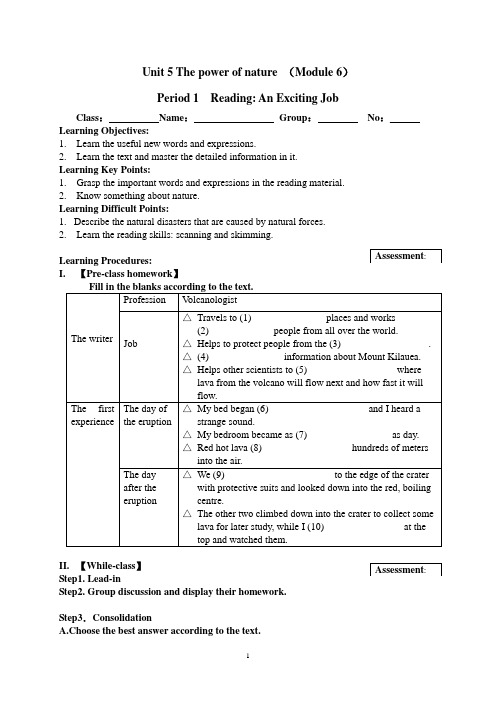
Unit 5 The power of nature (Module 6)Period 1 Reading: An Exciting JobClass:Name:__________ Group:No:______ Learning Objectives:1. Learn the useful new words and expressions.2. Learn the text and master the detailed information in it.Learning Key Points:1. Grasp the important words and expressions in the reading material.2. Know something about nature.Learning Difficult Points:1.Describe the natural disasters that are caused by natural forces.2. Learn the reading skills: scanning and skimming.Learning Procedures:I.【Pre-class homework】Fill in the blanks according to the text.The writer Profession V olcanologistJob△Travels to (1) ______________ places and works(2) ____________ people from all over the world.△Helps to protect people from the (3) _________________.△(4) ______________ information about Mount Kilauea.△Helps other scientists to (5) _________________ wherelava from the volcano will flow next and how fast it willflow.The first experience The day ofthe eruption△My bed began (6) ___________________ and I heard astrange sound.△My bedroom became as (7) ________________ as day.△Red hot lava (8) _________________ hundreds of metersinto the air.The dayafter theeruption△We (9) _____________________ to the edge of the craterwith protective suits and looked down into the red, boilingcentre.△The other two climbed down into the crater to collect some lava for later study, while I (10) _______________ at thetop and watched them.II.【While-class】Step1. Lead-inStep2. Group discussion and display their homework. Step3.ConsolidationA.Choose the best answer according to the text.Assessment: Assessment:1.What’s the main idea of para.3 ?A.Boiling rock which erupts from the volcano and crashes back to earth causes lessdamage.B. The lava that flows slowly down the mountain causes far more damage.C. The eruption is much more excitingto watch.D. There had been an eruption in theside of the mountain.2.The writer doesn’t mind the occasional danger of his job because ________.A. He travels to unusual places and meets interesting people from all over the worldB. He likes the different ways of workingC. He thinks his job the most importantD. He is excited about dangers and feels alive3.As a result of the glaciologist's work, _________.A.other scientists predict the progress of lava from the volcanoB. many people have been warned to leave their homesC. the eruption causes less damageD. the eruption may be prevented breaking out4.Why did the volcanologist's run out of the house into the back garden?A. Because his bed began shaking.B. Because his bedroom suddenly became as bright as day.C. Because he thought there was an earthquake in Hawaii.D. Because he wanted to collect information about the eruption.5. What does the writer mean by using “lucky” in the sentence “ I was luckyenough to have a much closer look at it. ” ?A. He left much safer on the top while theother two scientists climbed down into the crater.B. It was his first sight of an eruption.C. It was the first time for him to watch the crater.D. both B and C.B. Read the text again and fill in the blanks.I am a (1) _________________ (volcanology) who travels to unusual places and works(2) _____________ people from all over the world. I never feel (3) ______________ (bore) to collect and (4) ________________ (evaluation) the information for other scientists to study the lava. Although my job is (5) _________________ (occasion) dangerous, I don’t mind because danger (6) _______________ (excite) me and makes me feel alive. The most important thing is that our work has saved many lives. Unfortunately, we can’t move people’s houses, many of which (7)___________________ (burn) to the ground. Sometimes the eruption is an (8)_____________________ (absolute) fantastic sight. (9) __________________ (study) volcanoes now for many years, I am still as enthusiastic about my job (10) _______________ the day I first started.Step4.PresentationStep5.SummaryIII.【Post-class】Self- reflectionKEYS:Fill in the blanks.(1) unusual (2) alongside/with (3) volcano (4) Collects (5) predict(6) shaking (7) bright (8) was fountaining (9) made our way (10) stayed Choose the best answer according to the text.CDABDRead the text again and fill in the blanks.(1) volcanologist (2) alongside / with (3) bored (4) evaluate(5) occasionally (6) excites (7) have been burned/ burnt (8) absolutely (9) Having studied (10) asPeriod 2 Language points in Reading 1Class : Name : __________ Group : No :______ Learning Objectives:1.Learn and grasp the important useful new words and expressions.2. Learn the important useful sentences and patterns.3. Make sentences after the useful expressions. Learning Key Points:Learn the important useful sentences and patterns. Learning Difficult Points:Understand some difficult and long sentences.Learning Procedures:Ⅰ.【Pre-class homework 】A. Phrases 1. 被任命为 2. 在……的途中 3. 警告某人(不)要干某事 4. 不挡道,不碍事,躲开 5. 烧成平地 6. 在远处 7. 绝妙的奇景 8. 前往 9. 对……满怀热情 10. 对……感到惊叹B. Make sentences 1. appoint2. absolutely3. make one ’s way4. actual5. alongside6. glance through7. vary from …toⅡ.【While-class 】 Step1. Lead-inStep2. Group discussion Step3.Consolidation 1. I am never bored . 翻译:____________________________________________________________________ 练习:(1) Mr. Smith, tired of the ___________(bore)speech, started to read a novel. (2) I’ve heard all his stories before; they ______________ (bore) me. (3) I hope you ’re not getting _____________ (bore) by the conversation.Assessment : Assessment :2. I don’t mind because danger excites me and makes me feel alive.翻译:___________________________________________________________练习: (1) The good news was ______________ (excite) to John.(2) The good news _______________ (excite) John.(3) John was _____________(excite) at the good news.(4) alive / live / livingThe wounded man was unconscious but still ____________.He is one of the greatest composers _____________.He is one of the greatest ____________ composers.There is a red fish among all the ___________ ones.The football match will be televised ______________.3. I was about to go back to sleep when suddenly my bedroom became as bright as day.翻译:___________________________________________________________________ 中译英:(1)我刚要走,天就下起雨来。
人教版高中英语选修6《Unit5Thepowerofnature》教案

人教版高中英语选修6《Unit5Thepowerofnature》教案人教版高中英语选修6《Unit 5 The power of nature》教案【一】教学准备教学目标1. Knowledge objectivesKnow that the -ing form can be used as various kinds of adverbialsUnderstand the differences among “doing”, “having done”, “being done” and “having been done”2. Ability objectivesMaster the usage of the -ing form as adverbials and properly use it in writingPolish one’s writing with the -ing form as adverbials3. Emotional objectivesCultivate teamwork and confidenceFeel free to use English grammar in daily life教学重难点教学重点 Understanding four -ing forms used as adverbials and five tips on how to use the -ing form as adverbials 教学难点 Master the usage of the -ing form as adverbials and properly use it in writing教学过程Lead-in: Song appreciation(1) Play the song T ake me to your heart before class.(2) Start the class with a clip of the song sung by the teacher.(3) Lead the Ss to notice the -ing form used as adverbials in the lyrics.This is a warming-up step designed to arouse Ss’ enthusiasm and to come to the point.Step 1: We ChooseTask 1: Observe the -ing form in each sentence and decide what it refers to.(reason, result, concession, time, manner, condition)1. Being very rich, he spends as much money as he likes. (reason)2. Working hard, you’ll surely succeed. (condition)3. They sat there, waiting for the beginning of the sports meeting. (manner)4. Walking on the street, he came across a long-lost friend. (time)5. The polar bear was not careful enough, falling on the icy ground. (result)6. Not understanding what you are talking about, I still admire you. (concession)It is intended to remind Ss that the -ing form can be used as various kinds of adverbials. Ask several Ss to answer and, if necessary, interpret the sentences for them with adverbial clauses.Task 2: Check the words in red and decide their relation with the subject and the predicate. (A. active B. passive C. meanwhile D. before-after)Laughing and jumping, he left school.Having finished his homework, he left school.Being talked about at that time, he left school.Having been punished, he left school.First, let Ss choose the correct relation between the -ing form and the subject and that between the -ing form and the predicate in each sentence. Then lead Ss to sum up the differences among “doing”, “having done”, “being done” and “having beendone”.Task 3: Read the sentences aloud and recall the tips.When the reading is finished, ask Ss how to use the -ing form as adverbials.It is intended as a transition from “what” to “how” and the second step is naturally introduced.Step 2: We ChangeTask 1: (Group work) Identify the mistakes in the following sentences and change the sentences into correct ones. Discuss your reason.1. I had a wonderful childhood, travel around the world.2. When crossed the road, you should be careful.3. Having not finished his homework, he was punished by his parents.4. Working hard, your dream will come true.It is aimed to revise the usage of the -ing form as adverbials. By group discussion, Ss may find it easier to solve the problem. Matters such as non-predicate, relation, conjunction, negative words and logical subject are all involved.Task 2: (Pair work) Orally change the adverbial clauses or compound sentences into the -ing form as adverbials.e.g. After we have been informed of Mr. Li’s birthday, we hurried to express our best wishes on the blackboard.(Notice that only the clause part will be changed: predicate→non-predicate)Having been informed of Mr. Li’s birthday, we hurried to……1. Because we hoped to convey our concern for him, we asked Miss Zhu to bring him a card.2. When we danced together, we felt very excited.3. Although we had not met him before, we still treated himas an old friend.4. If you think it over, you will have a good idea.5. She stood on the stage and played with her hair.6. He was so humorous that he made us burst into laughter.It is designed for Ss to put into practice the tips mentioned in the previous task.Step 3: We ChatTask 1: Using the correct form of the given verbs, help me to complete the caption of my moment.Last month, I led my students to join in the oral English competition.(live) far away from the site, we had to get up early in the morning. (not eat) anything before, I felt hungry. As for the students, though tired, they were still enthusiastic about the coming challenge, (talk and laugh) on the bus. When (arrive) at the site, they were very excited.(devote) to practicing before, they did a wonderful job in the competition, (bring) glory to our school. As far as I am concerned, (make) great efforts to practice, any of you can also stand out.It is a revision of the tips mentioned. In addition, it sets an example of how to use the -ing form as adverbials in our daily life.Task 2: Writingo Choose a picture to post.o Write the caption for it.o Try to use the -ing form as adverbials. (3 minutes)Ss are asked to choose a picture from five and write the caption for it by using the -ing form as adverbials in 3 minutes. This is to integrate what has been covered and put it into practice.Task 3: Sharingo Move around the classroom.o Share your moment.o Get “like” or “comment”.(You may also leave your comment when discovering any grammatical mistake.)An example is shown to clarify the instruction. Then Ss are given five minutes to share their moments with their classmates. This is a peer proof-reading activity.Task 4: Presentingo How many“ likes” have you got?o What about “comments”?o Who would like to share with the whole class your moment or the comments you got?This is for several volunteers to present their works and notice the common mistakes when using the -ing form as adverbials.Step 4: SummarySummarize what we have learnt today:o 6 kinds of adverbialso 4 forms of -ingo 5 tipsThis is to remind Ss of what they have learnt today.课后习题Homeworko Review the usage of the –ing form as adverbials.(You may refer to a mini-lecture. )o Polish your caption and share it with your friends.o Finish exercise 3 - 5 on Page 64 of your exercise book.The homework is intended to familiarize Ss with the rules of the -ing form used as adverbials and to develop their writingskills.人教版高中英语选修6《Unit 5 The power of nature》教案【二】教学准备教学目标教学目标:1 深入理解课文,分析文章长难句,培养快速阅读、整体理解和写作的能力。
高中英语 Unit5The Power of nature学案5 新人教版选修6
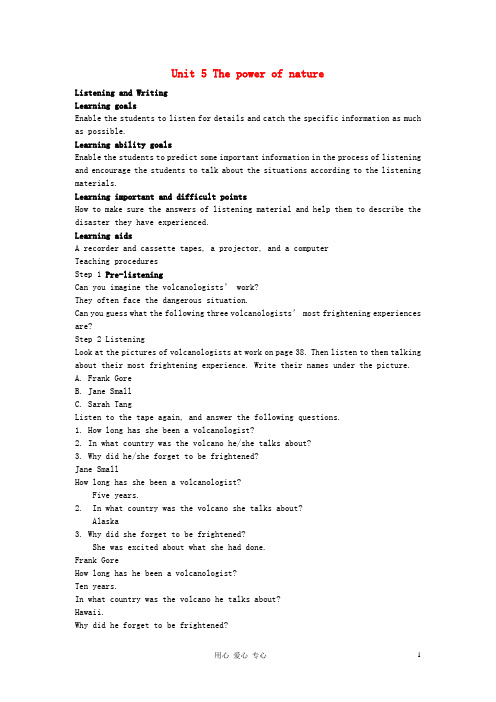
Unit 5 The power of natureListening and WritingLearning goalsEnable the students to listen for details and catch the specific information as much as possible.Learning ability goalsEnable the students to predict some important information in the process of listening and encourage the students to talk about the situations according to the listening materials.Learning important and difficult pointsHow to make sure the answers of listening material and help them to describe the disaster they have experienced.Learning aidsA recorder and cassette tapes, a projector, and a computerTeaching proceduresStep 1 Pre-listeningCan you imagine the volcanologists’ work?They often face the dangerous situation.Can you guess what the following three volcanolo gists’ most frightening experience s are?Step 2 ListeningLook at the pictures of volcanologists at work on page 38. Then listen to them talking about their most frightening experience. Write their names under the picture.A. Frank GoreB. Jane SmallC. Sarah TangListen to the tape again, and answer the following questions.1. How long has she been a volcanologist?2. In what country was the volcano he/she talks about?3. Why did he/she forget to be frightened?Jane SmallHow long has she been a volcanologist?Five years.2. In what country was the volcano she talks about?Alaska3. Why did she forget to be frightened?She was excited about what she had done.Frank GoreHow long has he been a volcanologist?Ten years.In what country was the volcano he talks about?Hawaii.Why did he forget to be frightened?The pilot had to fly low to get under the clouds.Sarah TangHow long has she been a volcanologist?Twenty years.In what country was the volcano she talks about?New Zealand.Why did she forget to be frightened?She felt the ground tremble.ListeningListen to the tape once more. Write the name of the person beside the things they said.1. I was so excited about what I had done and where I was, I forgot my fear. ( )2. I was very worried that the volcano might erupt while I was still inside it. ( )3. I was very relived when we finally reached our camp. ( )4. I was trembling almost as much as the ground under my feet. ( )5. I was still terrified. ( )6. I was so nervous that my whole body was damp with sweat. ( )7. I was so anxious that I couldn’t move for a long time. ( )I had to force myself not ton panic. ( )Then I got up the courage to bend over the boiling lava. ( )Step 3 SpeakingThink of a powerful natural disaster (such as an earthquake, food, typhoon, storm) that you have experienced. You can use your imagination if you have not experienced any of these things. Tell your partner about your experience and how you felt. Writing1. Choose one of the natural disasters or any other disaster you have experienced.2. Make a timeline to show the order in which the events happened. For example: 10am left holiday house to walk in the mountains12am saw dark clouds in the sky, started to go back12:30pm snowstorm started1:00pm we were completely lost… …3. Spend a few minutes on your own imagining your experiences and how you felt. Now imagine you are safely back home. Write a dairy entry about your experience.A possible version:Jane and I had been waking in the mountains when we noticed some dark clouds coming down the mountain. We decided to turn around and go home.As we walked the clouds got nearer and nearer and the day grew darker. Then all of a sudden it began to snow. It was soon snowing so hard we couldn’t see very far in front of us. Holding each others’ hands so we couldn’t get separated, we continued down the mountain. Butthe snow got deeper and deeper. Walking became harder and harder. We began to get very tired and very frightened.After a while the path became buried under the snow and we didn’t know which way to go. We were completely lost. We found some shelter behind a big rock. Hugging each other for warmth, we stayed like that until the storm was over. Luckily it only lasted an hour or two. Then the sun came out again and we could see our house in the distance. We were so relieved we both burst into tears.Step4 HomeworkFinish your writing.。
人教版高中英语选修六《Unit 5 The power of nature》教学设计
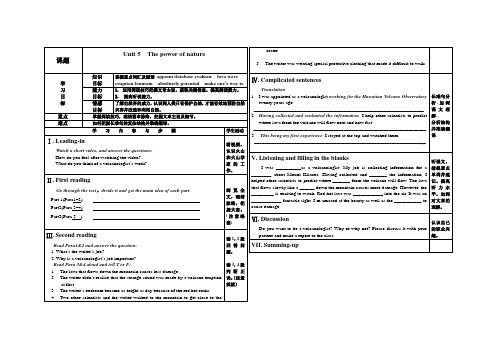
.Summing-up
Ⅷ.Homework
Please find outmoreadvantages anddisadvantages of volcanoesfrombooks or the Internet and then write a composition:
The Power ofVolca.Listening and filling in the blanks
I was__________as a volcanologist. Myjob is collecting information for a ________aboutMountKilauea. Having collected and _______the information, I helped other scientists to predict where _______from the volcano will flow.The lavathat flows slowly like a ______ down the mountain causes moredamage. However, the _________ is exciting to watch. Red hot lava was ____________ into the air. It was an ____________fantastic sight. I’m amazed at the beauty as well as the ___________to cause damage.
一分为二地看待事物,提高书面表达能力。
____________________________________________________________________
人教版英语选修六第五单元学案
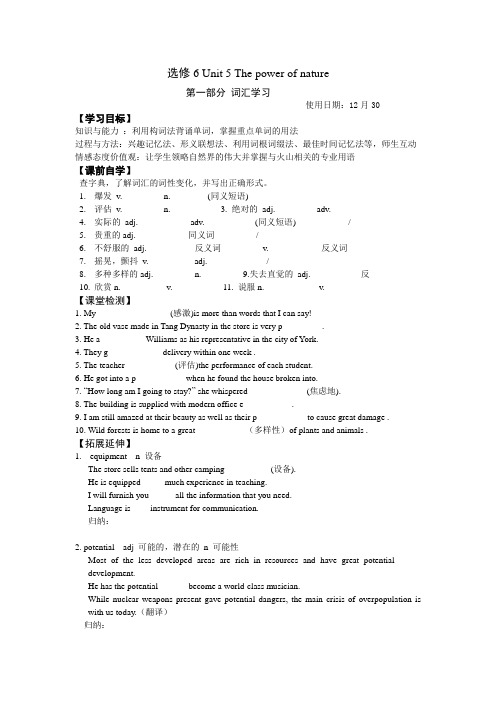
选修6 Unit 5 The power of nature第一部分词汇学习使用日期:12月30【学习目标】知识与能力:利用构词法背诵单词,掌握重点单词的用法过程与方法:兴趣记忆法、形义联想法、利用词根词缀法、最佳时间记忆法等,师生互动情感态度价值观:让学生领略自然界的伟大并掌握与火山相关的专业用语【课前自学】查字典,了解词汇的词性变化,并写出正确形式。
1.爆发v._________ n.________ (同义短语) _____________2.评估v._________ n. _________3. 绝对的adj._________ adv.____________4.实际的adj.__________ adv.___________ (同义短语)____________/____________5.贵重的adj.__________ 同义词_________ /_________6.不舒服的adj.__________ 反义词_________ v.___________ 反义词___________7.摇晃,颤抖v.__________ adj._____________ /_____________8.多种多样的adj._________ n._________ 9.失去直觉的adj. __________ 反___________ 10.欣赏n.__________ v.___________ 11. 说服n.____________ v._____________【课堂检测】1. My ________________ (感激)is more than words that I can say!2. The old vase made in Tang Dynasty in the store is very p_________.3. He a__________ Williams as his representative in the city of York.4. They g ____________delivery within one week .5. The teacher ___________(评估)the performance of each student.6. He got into a p ___________when he found the house broken into.7. “How long am I going to stay?” she whispered _____________(焦虑地).8. The building is supplied with modern office e___________.9. I am still amazed at their beauty as well as their p___________ to cause great damage .10. Wild forests is home to a great __________ (多样性)of plants and animals .【拓展延伸】1.equipment n 设备The store sells tents and other camping __________(设备).He is equipped _____much experience in teaching.I will furnish you _____ all the information that you need.Language is ____instrument for communication.归纳:____________________________________________________________________2. potential adj 可能的,潜在的n 可能性Most of the less developed areas are rich in resources and have great potential _____ development.He has the potential ______ become a world-class musician.While nuclear weapons present gave potential dangers, the main crisis of overpopulation is with us today.(翻译)归纳:________________________________________________________________________3.suit 适合It doesn’t suit you to have your hair cut short.The climate here doesn’t suit me.The design of the new glasses suits her face nicely.★【拓展延伸】match/ fit/suitThe colour of the shirt do esn’t _____that of the tie.The seven o’clock train will_____ you best.I have no dress _____to wear in public.The house is not _____for you to live in .He can’t ____her in English competition.归纳:_______________________________________________________________________ 4.panic v 使恐慌n 惊恐,恐慌The audience were thrown into a ________when the fire started.I _______(使恐慌) when I saw smoking coming out of the engine.The workers fled _____ panic as the fire broke out.归纳:_________________________________________________________________________5.guarantee vt 保证。
高中英语Unit 5 The power of nature教案人教版选修六

Unit5 The power of natureI.单元教学目标(技能目标)◆talk about volcanoes and the work of volcanologists◆practice expressing fear and anxiety◆learn the –ing form used as adverbial in a sentence◆write about an experience in a nature disasterII.目标语言1.功能句式: expressing fear and anxiety.◆I was so excited about what I had done and where I was, I forgot my fear.◆I was very worried that…◆I was very relieved when…◆I was trembling almost as much as the ground under my feet.◆I was still terrified.◆I was so nervous that my whole body was damp with sweat.◆I was so anxious that I couldn’t move for a long time.◆I had to force myself not to panic.◆Then I got up the courage to …2.词汇四会词汇:volcano erupt eruption ash hurricane adventure bore excite evaluate unfortunate unfortunately fountain absolute absolutely fantastic crater potential impress precious novelist cancel effort relieve tremble sweat anxiety anxious panic courage typhoon heaven diverse diversity unique bathe swallow guarantee词组:pare …with burn to the ground make an effort make one’s way glance through vary from … to3. 语法:the –ing form used as adverbial in a sentenceLooking carefully at the ground,I made my way to the edge of the crater.Having experienced quite a few earthquakes in Hawaii already, I didn’t take much notice.Period1 Warming up and pre-readingTeaching goals:a.Encourage the students to discuss volcanoes.b.Enable the students to know more about volcanoesTeaching important and difficult points:Talk about volcanoes and the work of volcanologistsTeaching aids:A recorder, a projector, and a puterTeaching methods:Brainstorm and discussion (Group work).Teaching procedures and waysIn order to talk about whatvolcanoes are and how they are formed, students need to learnSome new words: lava erupt/eruption crater active/dormant/extinct volcanoes Step I Show some pictures of disastersAsk student to name disasters as much as they know.Sample answer: cyclone typhoonHurricanetornadosnowstormlandslideV olcanotsunami earthquakefloodhailstormsandstormStep II QuestionsAsk them what they feel when they see the power of nature showing in the pictures:Have you ever experienced one?Share you experience and feelings? (Were you frightened and how frightened were you?)Some expressions tips: scared to death frightened worriedunforgettable unbelievableHave you ever seen a volcano?Ask Ss to plete exercise 1 in groups. Then check their answers orally as awhole class.Ask students to help you make a list of words connected with volcanoesDiscuss with students where in the world active and extinct volcanoes occur.Step III Pre-reading1) Can you tell me who will climb into a livevolcano in order to take the temperature?of the boiling rock inside?volcanologists——do they take up a crazy job?2)get the students to answer the six questions in pre-reading to find out whetherthey willenjoy working as a volcanologist.Students could do this activity as a survey by asking others in their class these questionsOr they could do it individually.3)after they have pleted the task, survey the class to find out how many mightenjoythe work of a volcanologist.their guesses were.Afterthoughts:_____________________________________________________________________ _____________________________________________________________________ _____________________________________________________________________ ______________________________________________________________Period 2Reading and prehendingTeaching goals:a.Enable the students to master some English expressions and phrases and to know someknowledge of volcanoesb.Enable the students to master important pointsTeaching important points:Let Ss learn to use the structures of giving suggestionTeaching methods:Skimming method, Task-based methodTeaching aids:A projector, a tape-recorder and a blackboardTeaching procedures and ways:Step I First readingScanning & skimmingAsk students to read through the passage quickly to get a main idea ofthe whole passage. Give them a limited time to read the whole passagein order to encourage them to practice reading for general ideas and todiscourage them from reading word by wordmain idea: This passage is a first-person account of a volcanologist’s experiences.The volcanologist described his exciting job and wrote down his firstsight of an eruption.What does a volcanologist do ?( answer in the text )Then let students do the multiple-choices (见课件)Set Exercise 1 in“prehending〞either as a group or whole-class activity. Explain to students that the purpose of questions like these is to help themdevelop skills of evaluating a text.Step II Second readingBefore reading, glance through Exercise 2 on Page35.Choose some to ask them and check their answers:1. Why is a volcanologist’s job important?V olcanologists study volcanoes so that they can warn people when the volcano is going to erupt and so save many lives.2. Why is the lava that flows on MountKilauea more dangerous than the actual eruption?The lava flows down the mountain and can cover up or burn villages in its path. the rocks that erupt from the volcano usually don’t damage anything because no one lives the crater.3.Why was it difficult for the writer to walk towards the edge of the crater ?The author was wearing special protective clothing that made it difficultto walk4. What does the writer find impressive about volcanoes even after studying them for 20 years?The author is impressed by the beauty of the eruption and also by its potential to cause great destruction.Step III Third reading (Read again to find more details)1).what made the author realize that an eruption occurred ?answer: my bed began shakinga strange soundmy bedroom became as bright as dayan abosolutely fantastic sightred hot lava was fountaining hundredsof metres into the air2).what did the scientists do after the eruption ?answer: put on white protective suits, helmets, big bootsdropped as closed as possible to the craterslowly make our way to the edge of the craterlooked down into the red boiling centerStep IV HomeworkSpend some time researching one disaster. You can use books, magazines,newspapers or the Internet. Collect pictures and diagram and look for information about:•what causes this kind of disaster•actrual events that happened in the past in china and/or the rest of the world •how people helped the victims•what is being done to prevent the disarster happening again or to lessen the damageAfterthoughts:_____________________________________________________________________ _____________________________________________________________________ ___________________________________________________________________________________________________________________________________Period3-4 Language PointsTeaching Aims1.To learn some new words and phrases.2.To learn some plicated sentence patterns.Teaching Important PointHow to help the students to master the usage of some useful words,expressions and sentences.Teaching Difficult PointHow to enable the students to grasp and remember the detailed information of the reading material.Teaching ProcedureExplain language points in the reading passage.1. have you ever considered how weak humans are pared with a volcano,hurricane or earthquake ?你是否想过,和火山,飓风或地震相比人类是何等脆弱。
人教版高二英语选修6教案:Unit5+The+power+of+nature+period1.doc
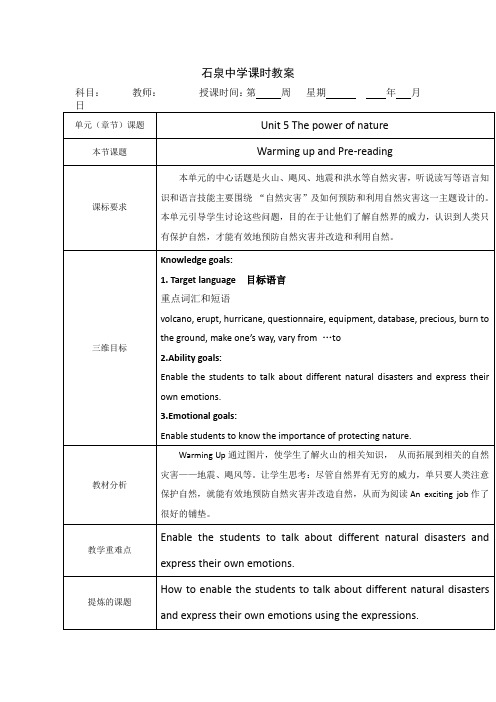
石泉中学课时教案科目:教师:授课时间:第周星期年月品味人生1、不管鸟的翅膀多么完美,如果不凭借空气,鸟就永远飞不到高空。
想象力是翅膀,客观实际是空气,只有两方面紧密结合,才能取得显着成绩。
2、想停下来深情地沉湎一番,怎奈行驶的船却没有铁锚;想回过头去重温旧梦,怎奈身后早已没有了归途。
因为时间的钟摆一刻也不曾停顿过,所以生命便赋予我们将在汹涌的大潮之中不停地颠簸。
3、真正痛苦的人,却在笑脸的背后,流着别人无法知道的眼泪,生活中我们笑得比谁都开心,可是当所有的人潮散去的时候,我们比谁都落寂。
4、温暖是飘飘洒洒的春雨;温暖是写在脸上的笑影;温暖是义无反顾的响应;温暖是一丝不苟的配合。
5、幸福,是一种人生的感悟,一种个人的体验。
也许,幸福是你风尘仆仆走进家门时亲切的笑脸;也许,幸福是你卧病床上百无聊赖时温馨的问候;也许,幸福是你屡遭挫折心灰意冷时劝慰的话语;也许,幸福是你历经艰辛获得成功时赞赏的掌声。
关键的是,你要有一副热爱生活的心肠,要有一个积极奋进的目标,要有一种矢志不渝的追求。
这样,你才能感受到幸福。
6、母爱是迷惘时苦口婆心的规劝;母爱是远行时一声殷切的叮咛;母爱是孤苦无助时慈祥的微笑。
7、淡淡素笺,浓浓墨韵,典雅的文字,浸染尘世情怀;悠悠岁月,袅袅茶香,别致的杯盏,盛满诗样芳华;云淡风轻,捧茗品文,灵动的音符,吟唱温馨暖语;春花秋月,红尘阡陌,放飞的思绪,漫过四季如歌。
读一段美文,品一盏香茗,听一曲琴音,拾一抹心情。
8、尘缘飞花,人去楼空,梦里花落为谁痛?顾眸流盼,几许痴缠。
把自己揉入了轮回里,忆起,在曾相逢的梦里;别离,在泪眼迷朦的花落间;心碎,在指尖的苍白中;淡落,在亘古的残梦中。
在夜莺凄凉的叹息里,让片片细腻的柔情,哽咽失语在暗夜的诗句里。
9、用不朽的“人”字支撑起来的美好风景,既有“虽体解吾犹未变兮”的执着吟哦,也有“我辈岂是蓬蒿人”的跌宕胸怀;既有“我以我血荐轩辕”的崇高追求,也有“敢教日月换新天”的豪放气魄。
人教版选修六Unit-5-The-power-of-nature知识点学案.doc

Unit 5 The power of nature 知识点学案重点词i匚1. erupt讨.(指火山)爆发;突然发生►Violence erupted after the football match.足球赛后突然发生了暴力事件。
►An active volcano may erupt at any time.活火山随时可能喷发。
知识拓展erupt into突然发出(尤其指叫喊)eniption n. [C&U]爆发►The little girl enipted into cry.那个女孩突然大哭起来。
►Signs of dangerous social eruption, actually were few.具有危险性的社会骚动迹象是很少的。
图解助记erupt, explode, burst跟跃曲简、…V J/ 选用erupt/explode/burst的适当形式填空1)In the city, the water pipes in some buildings cracked and.2)The bomb at a great distance from their observation point.3)No one knows when the social volcano below modern society willenipt爆发explode 爆炸burst爆炸;炸开volcano(火山)bomb(炸弹)gas(煤心;)blood vessel(血管)balloon(气球)答案:1 )burst 2)exploded 3)eruptJack 2. alongside 〃如在旁边;沿着边prep .在 ...... 旁边;沿着 ..... 的边► The police car pulled up alongside.那辆警车在旁边停下了。
► He parked his car alongside the fence.他把车顺着围墙停放。
选修6Unit 5 The power of nature学案 (2)

Unit 5 The power of nature学案(2)1. equipment n. 设备,装备Sometimes working outdoors,sometimes in an office,sometimes using scientific equipment and sometimes meeting local people and tourists,I am never bored. 有时在户外工作,有时在办公室,有时工作中要用科学设备,有时要会见当地百姓和游客,但我从未感到厌烦。
用法点拨The equipment of the photographic studio was expensive.摄影室的装备很昂贵。
We are in great need of medical equipment.我们非常需要医疗设备。
归纳拓展equip v. 装备,配备a piece of equipment一件设备camping/lifting /safety equipment露营装备/起重设备/安全装置equip sb. /sth. with sth. 给某人/某物配备或装备某物equip sb. /sth. for...为某人/某物装备……well/fully equipped设施齐全的;装备好的badly/poorly equipped装备差的完成句子(1) 没有足够的钱为他们配备最新的电脑系统。
There is not enough money to equip them with the latest computer systems.(2) 计算机是你将要买的最重要的一件设备。
A computer is the most important piece of equipment you will buy.2. appoint v. 任命;委派;约定(时间,地点等)I was appointed as a volcanologist working for the Hawaiian V olcano Observatory(HVO)twenty years ago. 二十年前我被任命为一名火山学家,在夏威夷火山观测站(HVO)工作。
人教新课标同步教学复习学案-选修六 Unit5 The power of nature

Unit 5 The power of nature 一、语言要点I单元要点预览(旨在让同学整体了解本单元要点)II 词语辨析(旨在提供完形填空所需材料)III 词性变化(旨在提供语法填空所需材料)IV 重点词汇(旨在提供综合运用所需材料)1. equipment n.[U][典例]1) After a fire broke out in the lab, a lot of equipment was damaged.实验室发生火灾后,许多设备都毁坏了.2) A good sleeping bag is an essential part of every camper’s equipment.一个完好的睡袋是每个露宿者必不可少的装备。
[重点用法]equip sb./sth. with sth. 用…装备起来./使具备…[练习] 汉译英1)士兵们配备着最新式的武器。
______________________________________________________________________________________ _2) 我们使孩子们受到良好的教育。
______________________________________________________________________________________ _3) 这位旅行家装备齐全。
______________________________________________________________________________________ _Keys: 1)The soldiers were equipped with the latest weapons. 2) We equip our children with a good education. 3) The traveller was well equipped.2.appoint vt.约定; 任命, 委任[典例]1) He was appointed mayor of the city.他被任命为市长。
高中英语 Unit5 The power of nature教案 新人教选修6
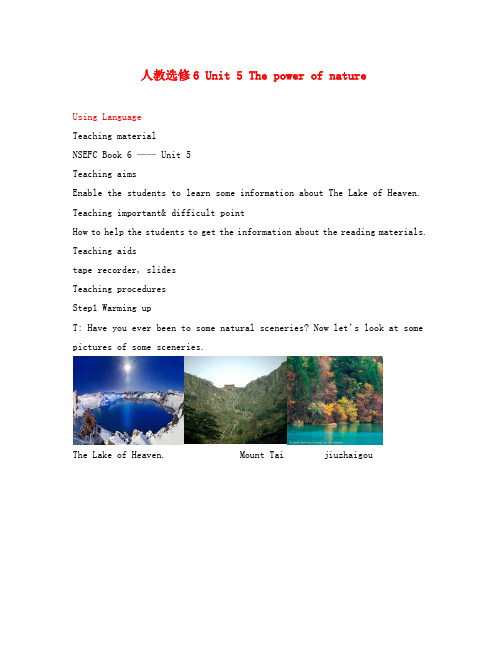
人教选修6 Unit 5 The power of natureUsing LanguageTeaching materialNSEFC Book 6 —— Unit 5Teaching aimsEnable the students to learn some information about The Lake of Heaven. Teaching important& difficult pointHow to help the students to get the information about the reading materials. Teaching aidstape recorder, slidesTeaching proceduresStep1 Warming upT: Have you ever been to some natural sceneries? Now let’s look at some pictures of some sceneries.The Lake of Heaven. Mount Tai jiuzhaigouMount Huang fuxianhu the we st lakeStep 2 Fast readingRead the text quickly and find out the key words(关键词) of each paragr aph.Paragraph 1 ChangbaishanParagraph 2 TianchiParagraph 3 storiesParagraph 4 coinStep 3 Careful ReadingRead the passage carefully and finish the following tasks.Paragraph 1 ChangbaishanLocationJilin Province, Northeast China PositionChina’s largest nature reserve Heightvaries from 700 m to 2,000 m Rare animals cranes, black bears, leopards and Siberian tigers The aims of visit ors To study the plants and animals ;walk in the mountains;Paragraph 2 TianchiParagraph 3 Fill in the blanks with some persons or animals to complete the chart.Three young women bathingfrom heaven a birdflewThe Manchupeopledroppedfather fruitA handsome gave birth toboy swallowed The youngest girlpregnantParagraph 4 coinYou and your ______ one drop a ____ into the clear, blue water to ______ __ your love will be as _____ and _______ as the lake.Keys: loved; coin; guarantee; deep; lastingStep 4 Detailed reading1. In what province is Changbaishan?In Jilin Province.2.What is a nature reserve? Why is Changbaishan a famous nature reserve?A place kept in its natural state for people to enjoy. The largest one in China.3.What is the most popular tourist attraction in the reserve? Tianchi, or the Lake of Heaven.4. What does Tianchi mean? How is Tianchi formed?The Lake of Heaven. In the crater of a dead volcano.5. What is the connection between the Manchu people and Tianchi?The story of the father of Manchu people.Step 5 DiscussionIf you were a tourist guide(导游), how would you introduce the Lake of Heaven in Changbaishan to the tourists?ChangbaishanTianchistorycoinThe Lake of Heavenin its four seasonsSpring summer autumn winterStep 6 HomeworkSurf the Internet to find more information about the Lake of Heaven.。
高中英语 Unit 5 The power of nature学案 新人教版选修6 学案

Unit 5 The power of nature核心单词1. appointvt.任命;委派He appointed Williams as his deputy in the city of York.他任命威廉姆斯作为他在约克郡的代理人。
He was appointed mayor of the city.他被任命为这个城市的市长。
常用结构:appoint sb. to a post 派某人担任某职The teacher appointed him (to be) monitor.老师任命他为班长。
联想拓展appointment n. 约会;约定;委任make/have an appointment with sb. 与某人约会break one’s appointment 违约;失约keep one’s appointment 守约appointed adj. 约定的;指定的Our visitors arrived at the appointed time.我们的来宾在约定的时间到达了。
高手过招翻译句子①校长任命了一位新主任。
②如果你想和他见面,你得预约。
答案:①The headmaster appointed a new director. ②If you want to meet him, you have to make an appointment.2. evaluatevt.评估;评价;估计The scientists have evaluated the data.那些科学家已经评价了那些资料。
We need to evaluate how well the method is working.我们需要对这一方法产生的效果作出评价。
联想拓展evaluation n. 估价;评价;计算accomplishment evaluation 学业成绩评定self evaluation 自我评价educational evaluation 教育评定evaluation factor 评价因素evaluation method 评价方法易混辨析evaluate/estimate/value三个词都含有“评价,估计”的含义。
